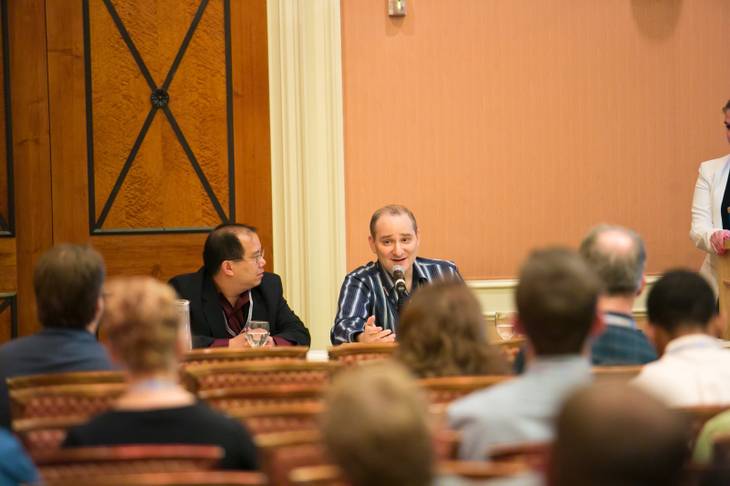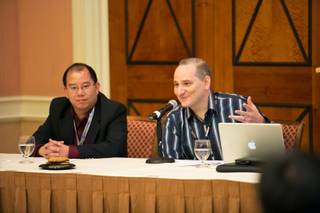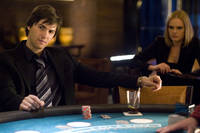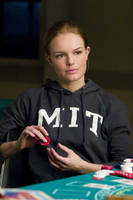They used math to beat casinos for a living.
Their exploits have been immortalized on the silver screen — in films like "21" — and before that between bindings on the best-seller list.
Educated at the prestigious Massachusetts Institute of Technology, the MIT Card Counting Team hauled millions of dollars out of casinos from coast to coast throughout the '80s and '90s.
Now, the team is long gone, but a few of its former members made an appearance at the 15th International Gambling and Risk Taking Conference at Caesars Palace this week to look back at their time counting cards for big cash.
You might recognize Andy Bloch, a self-proclaimed inventor and frequent player at the World Series of Poker. Already graduated from MIT in the mid-'90s, Bloch joined the team after he went to a buddy's poker party and met a student looking to start up a team.
Henry Houh's entrance came out of a curiosity. A grad student at MIT at the time, Houh couldn't help but notice his officemate lugging thousands of dollars in casino chips back to work.
Majestically broke and paying his way through school, Houh couldn't turn down the offer to join.
"It was great fun," Houh said. "There were all sorts of crazy stories … That's why it took me 13 years to get out of MIT."
A lot of those crazy stories kept many former members from attending the conference.
Like John Chang, who helped form the team in the early 1980s. Caesars later 86'd him for a reason he's not entirely sure of. But he recently sat down with Bloch to record video responses to play in his absence.
"The way people are abused? It's not quite like Guantanamo. It sort of paves the way for Guantanamo," Chang said, joking. "We're kind of the canaries in the coal mine."
Card counting isn't illegal, but casinos are wary of any tactic that can improve a player's chances. If a pit boss has reason to believe a player is counting — usually suggested with rapidly raised bets when the cards are stacked against the house — that boss can simply ask the player to leave.
The barring of gambling pros from casinos is a topic Bloch has always been passionate about.
"What that says about our freedoms and the direction we may be going," Bloch said. "Our ability to think is what really makes us human and it separates us from other animals, and when you kick someone out of a business or a country or whatever just because that person is exercising their ability to think, to me that's an affront to civil rights."
As the MIT team began to catch the attention of casino kings across the country, it didn't take long for its reputation to tarnish.
"I think the MIT team was mostly feared because of its name," Chang said. "You know? 'Oh, those MIT geniuses are gonna come in and levitate the chips out of the rack … 'Oh my god."
During one five-year stretch, Bloch said he pulled in an average of $100,000 a year. Houh landed on the lower end of the earnings report, making about $25,000 a year. That's because of his role, he said. He was never the "big player." He was the counter, staying focused at the table.
He actually made more money acting in a movie about the exploits of his team than he did during his tenure at MIT.
Houh — now an expert witness in Boston — played a blackjack dealer in the 2008 box office smash "21" — a film based on Ben Mezrich's best-selling book "Bringing Down the House."
While the movie was entertaining — making more than $200 million worldwide — pros deeply involved in the real-life plot on which it was based say the film was far from accurate.
"There's very little in the movie that's true," Change said. "[But] it captured the flavor of what we were doing."
For one, there was no conniving college professor — Kevin Spacey's character — who threatened players if they didn't follow his orders.
The MIT Card Counting Team formed from the inkling of Chang and two other college professors in Boston.
There were no required stress tests at an underground card room in Chinatown. While players had to pass entrance exams to play on the team, they took them at MIT.
What the film got right — essentially — was its portrayal of players' nonchalant attitudes toward hard cash, Houh said.
Houh, Bloch and Chang carried thousands of dollars of dough through airport security.
When Chang got married and his wife cleaned out the apartment, Bloch said, it didn't take her long to find thousands of dollars in cash and chips kept in random places.
Bloch said he recalls a time when he walked from his apartment in Cambridge to Harvard Square with $300,000 in his backpack.
Sounds glamorous, but the MIT pros will tell you: They learned the value of playing blackjack long after leaving the team.
They quickly learned that the guys who make the most money aren't in blackjack anymore. Many went on to run hedge funds or build a dot-com start-up or contribute to booming companies like Microsoft, Chang said.
"I think blackjack really is more like a training to be successful in something else," Chang said. "It's like the minor leagues. I didn't really recognize that at first, but it just is so."



